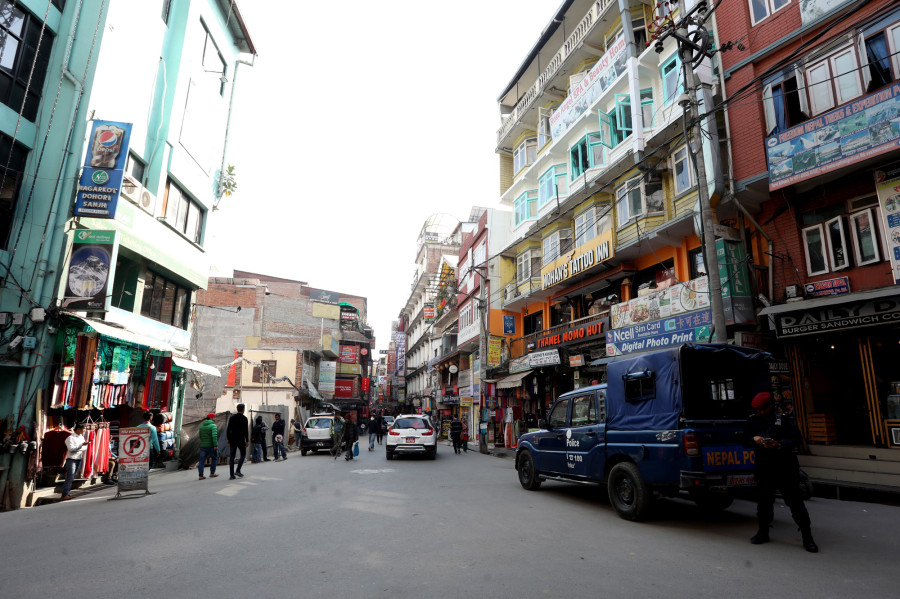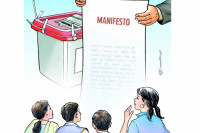National
Restaurants and bars in Thamel are looking at staff layoffs and ultimately, a shutdown
The Covid-19 pandemic has emptied Thamel of foreign visitors, who form the primary customer base for the tourist hub’s hundreds of restaurants and bars.
Prithivi Man Shrestha
Thamel’s K-Too Beer and Steakhouse Restaurant has already sent five of its 28 staff home on a 45-day hiatus due to a lack of customers. With the ongoing Covid-19 pandemic, foreign tourists, K-Too’s primary customer base, have all but vanished, and so has business for the hundreds of restaurants and bars in Thamel that largely cater to visitors.
Even before the government stopped issuing on-arrival visas to all foreign tourists, visitor numbers had already started to fall. But now, with almost all visitors barred from entering the country, Thamel is largely deserted.
This has led businesses to take cost-cutting measures, like instituting forced leave or even laying off staff.
“I am preparing to send most of my staff on leave and keeping just five staff—three in the kitchen, one cashier and one waiter—to serve any customers,” said Ek Raj Adhikari, proprietor of the K-Too Restaurant. “I may have to shut down the restaurant if the situation remains the same after a week.”
Adhikari, who is also general secretary of the Restaurant and Bar Association of Nepal, said that although he has offered his staff paid leave, recalling them will depend on what happens with tourist arrivals in the near future.
The pandemic has brought Nepal’s tourism sector to its knees, with barely any business, drastically affecting the livelihoods of people who depend heavily on tourists, especially during the most lucrative time of the year—the spring tourist season.
Nepal’s tourism sector generated Rs240.7 billion in revenue and supported more than 1.05 million jobs directly and indirectly in 2018, according to the annual World Travel and Tourism Council research report. Travel and tourism's total contribution to the country’s GDP was 7.9 percent in 2019.
But this year, with revenue drying up, those same numbers look near-impossible to achieve.
According to Adhikari, around 350 restaurants in Thamel are on the verge of closure, as it is not just tourists who’ve vanished but locals are also staying home for fear of the coronavirus.
“Our daily transactions have gone down by 30-40 percent compared to the same period last year,” said Araniko Rajbhandari, proprietor of ND’s Fast Food, who is also the president of the restaurant and bar association. “I have already sent some of our staff home on leave for two months.”
Most restaurants in the tourist hubs of Kathmandu, Pokhara and Chitwan have been affected by the Covid-19 outbreak. There are around 2,500 restaurants in these three locations, which conduct daily transactions of around Rs140 million a day, according to the Restaurant and Bar Association of Nepal. Around 60,000 staff are employed by these restaurants, the association said.
On Sunday, the association held a meeting with representative trade unions from the tourism sector about cost-cutting measures amid the crisis in the tourism sector.
“Hotels and restaurants have already started sending workers on forced leave and have started cutting their facilities,” said Madhav Pandey, president of the All Nepal Hotel Casino and Restaurant Workers’ Association, a trade union associated with the former UCPN (Maoist), which merged with the UML to form ruling Nepal Communist Party. The trade unions of each party have yet to merge.
During the meeting, Pandey assured restaurant owners that workers were ready to give up as much as possible on the condition that their jobs are guaranteed.
“We asked them to continue operations but to also ask the government to provide a package for the revival of the tourism sector,” said Pandey.
Considering Covid-19’s impact on employment, experts have suggested that the government mobilise its employment and social security tools to assist those who could lose their jobs.
“The government can employ them under the Prime Minister’s Employment Programme,” said economist Shankar Sharma. “The government can also continue contributing to workers’ provident funds until businesses recover and workers find new jobs, and are able to make contributions on their own.”
Hotel bookings and flights have all taken a significant hit, with the entire tourism industry looking towards the government for support in lean times. Hotels in Thamel, Pokhara and Chitwan are running empty while airlines have cut prices by more than half to attract fliers. The tourism industry is now considering targeting the domestic market in order to salvage whatever it can.
However, the government’s travel advisory, asking Nepalis to avoid public gatherings as much as possible, is already leading many potential customers to stay home.
“The government’s messaging should not lead people to avoid going out to restaurants as only one case of Covid-19 has been identified in Nepal so far,” said Rajbhandari.
But in hard times, the restaurant and bar association is focussing on deliveries to keep some income coming in.
“We have held discussions with food delivery companies such as Foodmandu,” said Rajbhandari. “We have asked them to reduce their commission, considering the impact on the restaurant sector, and to also take food delivery orders for more restaurants.”




 10.12°C Kathmandu
10.12°C Kathmandu















